
Barnard Elliott Bee Jr. was a career United States Army officer and a Confederate States Army general during the American Civil War. He was mortally wounded at the First Battle of Bull Run, one of the first general officers to be killed in the war. During that battle, he was responsible for inspiring the famous nickname for Brig. Gen. Thomas J. "Stonewall" Jackson.

Samuel Cooper was a career United States Army staff officer, serving during the Second Seminole War and the Mexican–American War. Although little-known today, Cooper was technically the highest-ranking general officer in the Confederate States Army throughout the American Civil War, even outranking Robert E. Lee. After the conflict, Cooper remained in Virginia as a farmer.
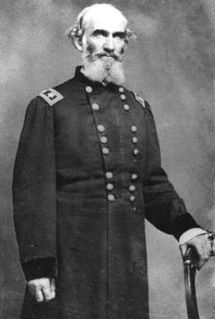
Andrew Jackson Smith was a United States Army general during the American Civil War, rising to the command of a corps. He was most noted for his victory over Confederate General Stephen D. Lee at the Battle of Tupelo, Mississippi, on July 14, 1864.
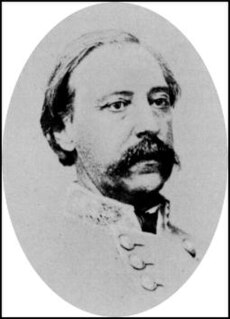
Goode Bryan was a planter, politician, military officer, and American Civil War general in the Confederate States Army. His brigade played a prominent role during the Battle of the Wilderness, fighting stubbornly until exhausting its ammunition.

John Joseph Abercrombie was a career United States Army officer who served in numerous wars, finally reaching the rank of brigadier general during the American Civil War.
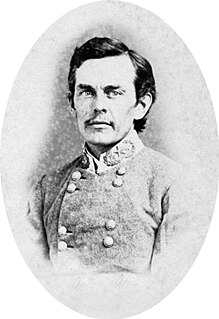
Bryan Morel Thomas was an American soldier, farmer, marshal, and educator. He served as an officer in the United States Army, and later in the Confederate States Army during the American Civil War. He was a son-in-law of Jones M. Withers, under whom Thomas would serve in the war. Thomas also participated in and was captured during the 1865 Battle of Fort Blakely, the conflict's final infantry fight.

Daniel Weisiger Adams was a lawyer and a brigadier general in the Confederate States Army during the American Civil War.

Philip Sidney Post was an American diplomat, politician, and decorated Army officer. He served as a United States Representative from Illinois for eight years, from 1887 to 1895. During the American Civil War, he was a Union Army officer and earned the Medal of Honor.
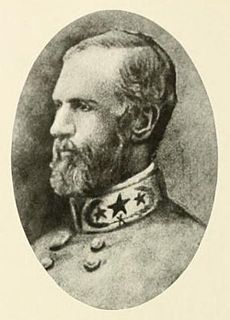
Jeremy Francis Gilmer was an American soldier, mapmaker, and civil engineer most noted for his service as the Chief Engineer of the Confederate States Army during the American Civil War. As a major general, he oversaw the planning of the elaborate defenses of the city of Atlanta, Georgia.

Lewis Henry Little was a career United States Army officer and a Confederate brigadier general during the American Civil War. He served mainly in the Western Theater and was killed in action during the Battle of Iuka.

The general officers of the Confederate States Army (CSA) were the senior military leaders of the Confederacy during the American Civil War of 1861–1865. They were often former officers from the United States Army prior to the Civil War, while others were given the rank based on merit or when necessity demanded. Most Confederate generals needed confirmation from the Confederate Congress, much like prospective generals in the modern U.S. armed forces.
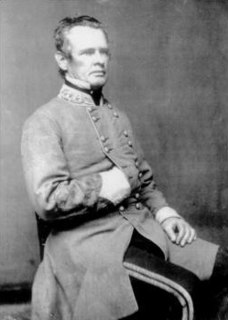
Gabriel James Rains was a career United States Army officer and a brigadier general in the Confederate States Army during the American Civil War.
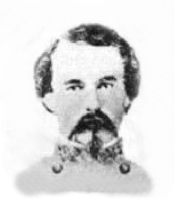
William Duncan Smith was a career United States Army officer who fought in the Mexican–American War. Later he served as a Confederate general during the American Civil War, and he died in the second year of the war from yellow fever.

Danville Leadbetter was a career U.S. Army officer and later he served as a Confederate general during the American Civil War.
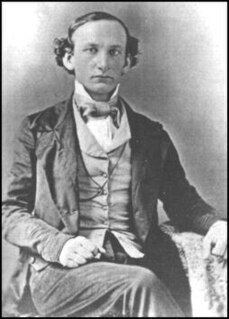
John Dunovant was a brigadier general with temporary rank in the Confederate States Army during the American Civil War. Dunovant was a native of South Carolina who had been a Mexican–American War veteran and captain in the U.S. Army from March 3, 1855, to December 29, 1860. During the Civil War, he was commander of the 1st South Carolina Regulars and later the 5th South Carolina Cavalry Regiment. He was in command of a cavalry brigade in the later part of the Overland Campaign and the early part of the Siege of Petersburg. He was killed at the Battle of Vaughan Road on October 1, 1864, during the Siege of Petersburg.

The General in Chief of the Armies of the Confederate States, or simply General in Chief, was the commanding general and head of the Confederate States Army from February to April 1865. The office was effectively abolished on April 9, 1865, when General Robert E. Lee surrendered to the Federal forces at Appomattox, Virginia. Despite being the General in chief, Lee was not the highest ranking Confederate general officer.
















